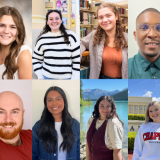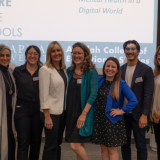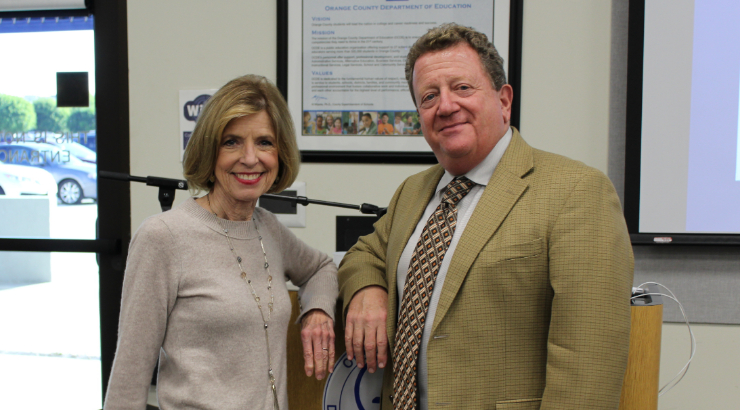
Thompson Policy Institute Hosts OCDE Workshop on Inclusive Education I-TAC grant helps advance inclusive classroom instruction
February 12, 2019
On a recent sunny Southern California morning, school site and district administrators as well as educators and school district coaches gathered for a full-day interactive workshop on differentiation of instruction in inclusive classrooms. The workshop was hosted by the Attallah College of Educational Studies’ Thompson Policy Institute in collaboration with the Orange County Department of Education (OCDE). The workshop participants compared and contrasted traditional, retrofit, and universal design for learning (UDL) approaches to differentiation; explored design points in developing differentiated lessons; practiced retrofit approaches to differentiation; and examined frameworks to facilitate UDL.
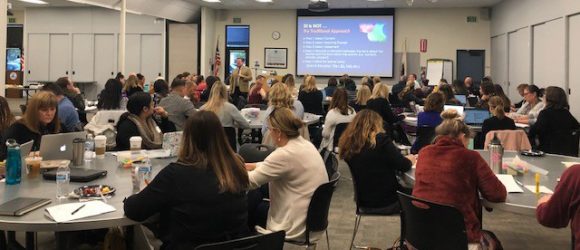 The event was funded by the Inclusion Technical Assistance Collaborative (I-TAC), a grant-funded initiative that strives to enhance research and technical assistance surrounding the development and implementation of inclusive education in the United States and Orange County.
The event was funded by the Inclusion Technical Assistance Collaborative (I-TAC), a grant-funded initiative that strives to enhance research and technical assistance surrounding the development and implementation of inclusive education in the United States and Orange County.
With I-TAC grant funds, TPI is able to support local school districts in their inclusion efforts by offering professional development such as this OCDE workshop. According to TPI’s Associate Director Audri Gomez, Ph.D., TPI will eventually also provide technical assistance to schools and be implementing new extended education courses through Chapman’s Attallah College of Educational Studies on inclusive education.
Pressing Need for Inclusive Education
The research findings reported at TPI’s 2018 DisAbility Summit showed that, of the 241 district-level administrators across California, 23% had never been certified in special education. Additionally, two-thirds of survey participants said that their district’s mission statement does not specifically address inclusion.
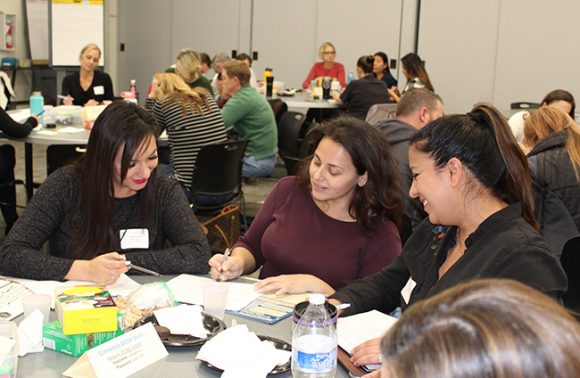
OCDE workshop participant table discussion
Researchers also concluded that California and Orange County are far behind the national average in the progression of inclusive education, such that the percentage of students with autism placed in general education classrooms in Orange County is notably lower than the national average of 55%. According to the Thompson Policy Institute, California places only 32% of its students with autism in general education classrooms.
“In a segregated classroom, students don’t have the same educational access and opportunities as their peers without disabilities,” Dr. Gomez said. “Decades of research has shown that students with disabilities do better academically, socially, and behaviorally when they’re included in an environment with their peers without disabilities.”
Esteemed Keynote Speakers
The recent OCDE workshop featured two keynote speakers: President of Bayridge Consortium, Inc. Richard A. Villa, Ed.D., and Jacqueline Thousand, Ph.D., Professor Emerita and developer of the special education teacher graduate programs in the College of Education, Health and Human Services at California State University, San Marcos. Drs. Villa and Thousand have written numerous books and publications and presented across the United States and internationally on the topic of support for individuals with disabilities.
“These speakers are well known in our field, so it’s great to have them guiding our workshop participants in professional learning,” Dr. Gomez said. “This is an opportunity for teachers, educational coaches, and district personnel to learn how they can best support students with disabilities in an inclusive environment.”
Practical Strategies and Takeaways
At the end of the day, many of the workshop participants said they particularly appreciated how the speakers were able to bridge theory and practice.
Marnie Dean, an OCDE special education TOSA (teacher on special assignment), who has taught special education for many years, said the workshop has helped her view her students’ strengths and limitations differently.
“I like that Dr. Villa said to look at the whole child and not the disability. I got a lot out of the workshop, but that really was eye-opening to me,” she said.
Dean and other participants said they were able to take away a lot of practical strategies, as the presenters’ real-life examples helped demonstrate how to implement the concepts and make them work in the classroom with real students.
Matt Riggle, a seventh grade teacher at Vista Heritage Global Academy in Santa Ana, said the workshop also opened his eyes to importance of inclusive instructional practices.
“I learned that implementing UDL is going to be really important to be able to hit all my learners in the class so that no one is left out,” he said. “At my school we have a large population of middle school special ed students, and I want to make sure that I’m giving them the access that everyone else getting.”
Future Collaboration
TPI and OCDE expect to hold more, higher-capacity workshops on related topics at larger venues. OCDE expressed interest in having a series of workshops in the future that will last three to four days, and it plans to continue working with Chapman in an effort to increase inclusive education.
Pamela Tupy, Ed.M., OCDE’s coordinator of educational services, says OCDE is excited to partner with to partner with Chapman’s Thompson Policy Institute: “As we move forward in our work with supporting districts in their implementation of a multi-tiered system of support (MTSS), we believe that inclusive practices in academics, behavior, and social-emotional learning enable all students to participate meaningfully in the community, including students with disabilities.”
Dr. Richard Villa will be back at Chapman later this spring to speak on advocating for inclusive education at TPI’s Annual DisAbility Summit on Friday, April 19, 2019 at the Marybelle and Sebastian P. Musco Center for the Arts. The event is free and open to the public.
Visit TPI’s website for more information about its research and upcoming events, including the upcoming 2019 DisAbility Summit.
Display Image at Top: OCDE workshop speakers Drs. Richard A. Villa and Jacqueline Thousand
